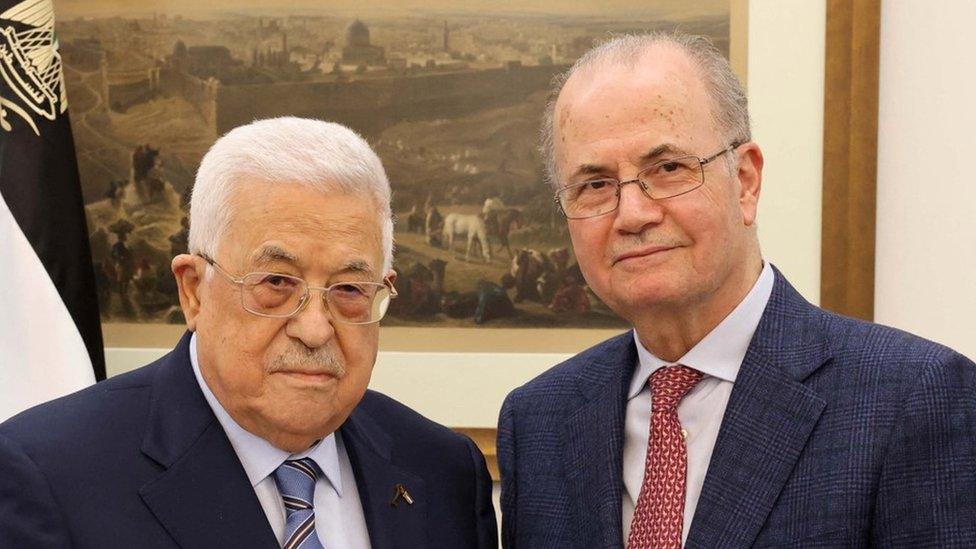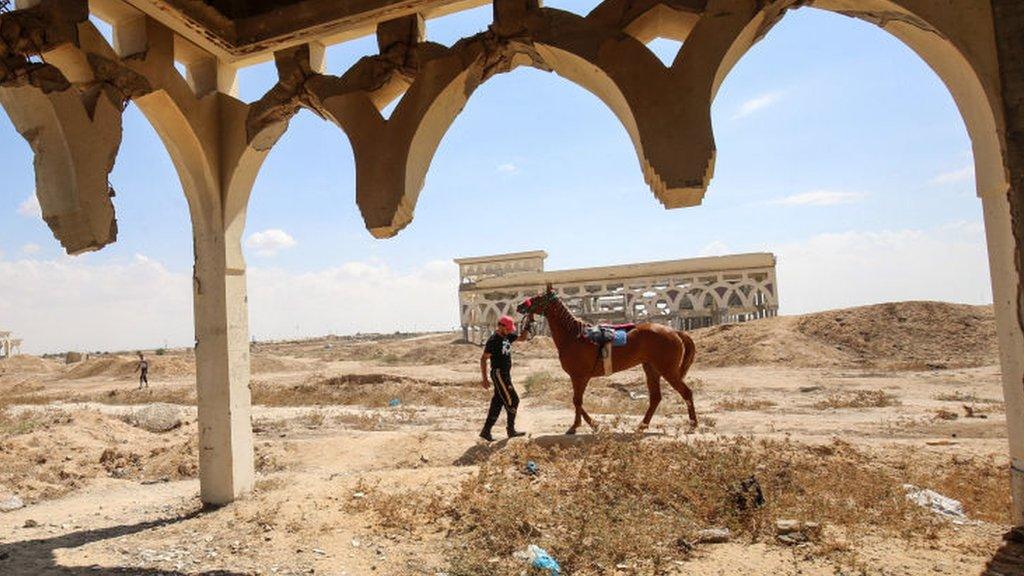Palestinian president appoints long-time adviser as prime minister
- Published

Mohammed Mustafa (R) is a long-time economic adviser to President Mahmoud Abbas (L)
President Mahmoud Abbas has appointed Mohammad Mustafa as the prime minister of the Palestinian Authority, which runs parts of the occupied West Bank.
Mr Mustafa, a US-educated economist and former senior World Bank official, is a long-time adviser to the president.
His predecessor, Mohammed Shtayyeh, resigned three weeks ago, citing the "emerging reality in the Gaza Strip".
Mr Abbas is under pressure from the US to reform the PA so it can govern Gaza after the Israel-Hamas war ends.
Israel's Prime Minister Benjamin Netanyahu presented last month a vision for the territory that made no mention of any role for the PA.
The Israeli military launched a large-scale air and ground campaign in Gaza after Hamas gunmen killed about 1,200 people in southern Israel on 7 October and took 253 other people hostage.
Gaza's Hamas-run health ministry says at least 31,300 people have been killed in the territory since then.
The presidential decree issued on Thursday appointing Mr Mustafa said his priorities included leading humanitarian relief efforts in Gaza and organising the reconstruction of what has been destroyed during the war.
Another priority was to develop plans for the "reunification of institutions across the homeland's governorates as a single geographical, political, national, and institutional unit", it added.
It also called for "continuing the reform process" of Palestinian institutions, with the aim of "a robust and transparent governance system subject to accountability, combating corruption, and ensuring good governance".
Mr Mustafa, who has a PhD in economics from George Washington University, has been chairman of the Palestine Investment Fund since 2015.
Before that, he served for two years as deputy prime minister and economy minister and was involved in reconstruction efforts in Gaza following the 2014 war between Israel and Hamas.
The White House welcomed Mr Mustafa's appointment and called for the formation of a "reform cabinet" as soon as possible.
"The United States will be looking for this new government to deliver on policies and implementation of credible and far-reaching reforms," National Security Council spokesperson Adrienne Watson said.
"A reformed Palestinian Authority is essential to delivering results for the Palestinian people and establishing the conditions for stability in both the West Bank and Gaza."
However, Ramallah-based Palestinian political analyst Khalil Shaheen said Mr Mustafa's closeness to the president might limit the prospects for reforms.
"In the end, [he] remains the right-hand man of President Abbas," he told AFP news agency. "Abbas wants to say that he supports reforms, but they remain under his control."
Another analyst said they would reserve judgement until they saw who Mr Mustafa named in his cabinet.
Some reports have said he will appoint technocrats in the hope that Israel could be persuaded to let them govern Gaza after the war.
The PA, which was established in 1994 under the Oslo accords, has limited governance powers in parts of the occupied West Bank not under full Israeli control and is dominated by Mr Abbas's Fatah movement, Hamas's rival.
It lost control of Gaza in 2007, when Hamas ousted forces loyal to Mr Abbas a year after winning the last Palestinian elections, and is deeply unpopular among many Palestinians, both in the West Bank and Gaza.
In November, US President Joe Biden said Gaza and the West Bank "should be reunited under a single governance structure, ultimately under a revitalised Palestinian Authority, as we all work toward a two-state solution".
Mr Netanyahu's plan for post-war, "demilitarised" Gaza did not rule out a role for the PA. But it also did not specifically mention the body either. It instead talked about handing responsibility for civilian management and public order to "local elements with managerial experience".
- Published13 September 2023
